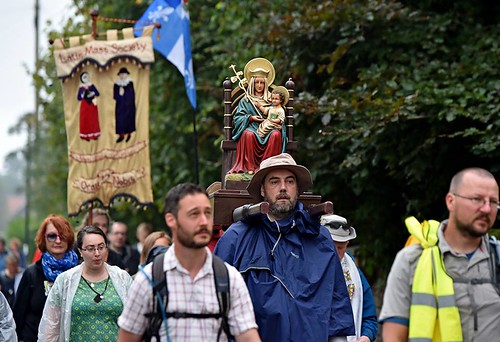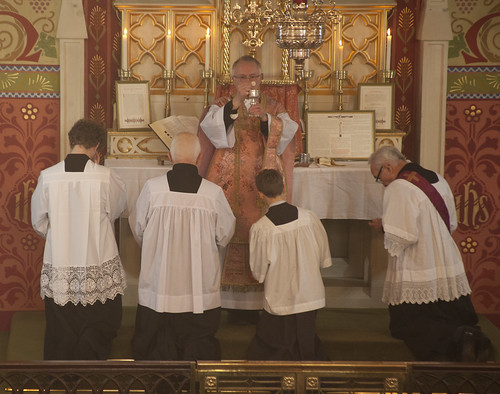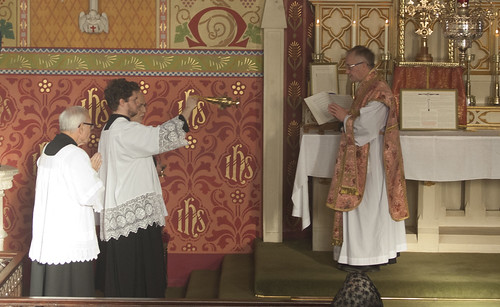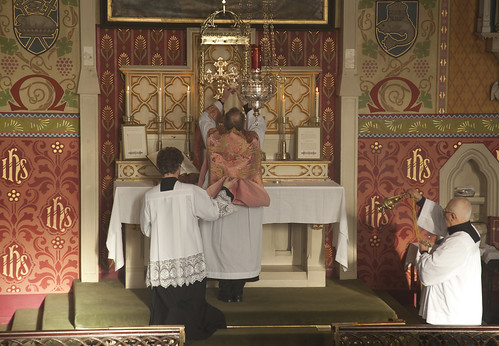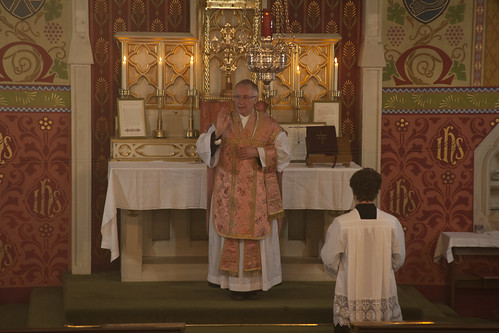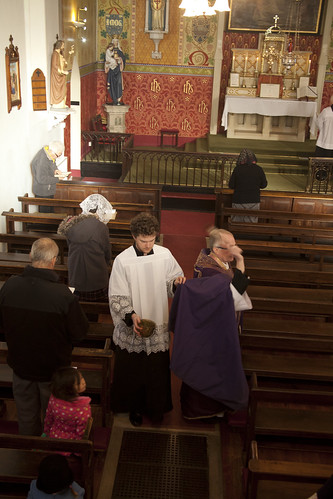Chairman's Blog
Do something good in 2017: sponsor a pilgrim to Walsingham (or go yourself)
The booking form for the LMS Walking Pilgrimage from Ely to Walsingham is now live, with a discount for early booking: secure the same prices as the 2016 pilgrimage by booking before Easter Sunday: and yes, they will be going up, and even so will not cover the whole cost of the pilgrimage.
If you feel that walking nearly 60 miles in two and a half days at the end of August isn't for you, or if you simply can't make it this year, you can still take part, thanks to a new scheme we have organised: you can sponsor a pilgrim.
We strive to match the sacrifices of the walking pilgrims with splendid liturgy, the best possible support on the road, and proper evening meals, cooked from scratch each day. At the same time, we want to keep pilgrims’ fees as low as possible, with generous discounts for children and students. We don’t charge our chaplains, or seminarians and religious. Our volunteers, also, need to be supported.
To do this in 2017 and beyond, we need your help
In the Middle Ages those who could not go on pilgrimage in person would often sponsor poor pilgrims, and in this way share in the graces received, asking the pilgrims to pray for their intentions. In modern times, pilgrims of the Guild of Our Lady of Ransom carried a satchel of written petitions, from supporters, to Walsingham. There is a box for such written petitions in the Slipper Chapel.
In 2016, LMS pilgrims were accompanied by Fr Michael Rowe from Perth, Australia, and Fr James Mawdsley FSSP. We had Friars from Gosport, a seminarian, and a lay brother from France. We’ve been joined over the years by secular clergy, and members of the ICKSP and the F.SS.R. from Papa Stronsay.
Our tireless support team includes three drivers and five cooks, as well as leaders of chapters, marshalls, and singers. In 2016, we had 16 children and students with us.
Don’t miss your chance to play a part in the Walsingham Pilgrimage
The Pilgrimage in 2017 and beyond is only going to be possible with the help of you, our pilgrims’ sponsors.
- Pray for you, with your name, as ‘anon’, or ‘in memoriam’ or your deceased loved ones, listed in pilgrims’ information packs.
- Offer Mass for you during the Pilgrimage, on the Saturday morning.
- Carry your petitions, in written form, by foot from Ely to Walsingham, for deposit beneath the Shrine image in the Slipper Chapel.
Support the work of the LMS by becoming an 'Anniversary Supporter'.
The joys of polarisation
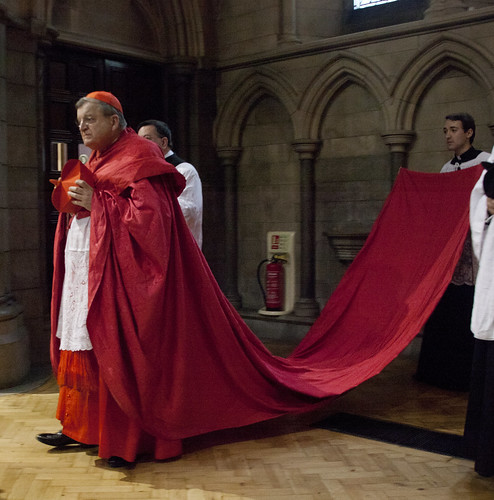 |
| Cardinal Burke in St James', Spanish Place, for the Latin Mass Society |
It is interesting to see EWTN giving Cardinal Burke the interview I posted yesterday, and the general pro-dubia stance they have taken. A similar editorial line is being taken by Church Militant. Less surprising is the support for the dubia coming from LifeSiteNews, which has long had a robust editorial line.
From a Traditional Catholic point of view, each of these organisations has come in for criticism over the years. Christopher Ferrara wrote a book, EWTN: A Network Gone Wrong with some stinging criticisms of their TV broadcasts, which showed a marked tendency to tone down their attachment to the Church's traditional teaching and spirituality after the retirement of Mother Angelica. I myself criticised Michael Voris's absurd and inconsistent vow never to criticise the Holy Father; in fact his 'Vortex' videos have continued studiously to avoid the subject of the dubia, which has been covered for them, as far as I can see, by Christine Niles. Even LifeSiteNews failed, in the end, to back up Hillary White when she was attacked some time ago by Ultramontanist fanatics for reporting something about the Pope which they simply wished hadn't happened.
Reporting on the dubia in an even-handed way, giving the dubia the oxygen of publicity, is precisely what the Pope's self-described supporters do not want, and doing so pushes these organisations away, or further away, from the institution mainstream of the Church. That means things like the degree to which bishops' press people would return their calls or help them arrange interviews, the degree to which people in the Curia in Rome would regard them as a respectable Catholic news service, and things like that.
The same process can be seen with what we might call the intellectual heavyweight conservative Catholic blogs and journals, such as Crisis, Catholic Culture, and First Things. These have never been 'traddie', on matters liturgical and spiritual, and often writers on these platforms have gone to a lot of trouble to give Pope Francis the benefit of the doubt, to promote his initiatives, explain his ideas and so on (as, in fact, have I on this blog). But with the crisis over the dubia they have been carrying some very hard-hitting stuff in support of the Cardinals.
As with the news services, there is a price to be paid for not taking the party line on something as contentious and important as this. There are many Catholic institutions, for example, which would allow their members to have associations with some kinds of Catholic publication, but not others, and the quickest way to become persona non grata in lots of places where lots of resources are controlled is to allow oneself to seem to be not 'with the Pope', when the pope was going in a liberal direction. So the writers on these platforms may end up losing certain opportunities, and the editors may for the same reason find it harder to recruit writers.
But we can see individual Catholic figures, with their own personal careers and reputations and influence to consider, coming out in support of the Cardinals, in the various joint letters, and notably with Professors Finnis and Grisez. These two of course don't need to worry about getting promotion, but they are still taking a risk with the considerable influence they have had over the years with Bishops' Conferences and over younger scholars, if they cease to appear to be balanced, mainstream, people who basically 'support the Pope'.
So, first, on a personal note I would like to express my admiration and gratitude for and to the people involved in all of these ways, nearly all of whom have more to lose than I have in speaking out. What they are doing is their duty: and I should emphasise that this is so even if they (and I) are mistaken. Perhaps there is a perfectly sensible explanation of the meaning of Amoris laetitia in combination with other statements and hints. We are still right to ask what that explanation is.
The wider point is that the move of Catholic intellectuals in support of the dubia is so marked that Austen Ivereigh was obliged to acknowledge it, suggesting that the reason all these academics and writers were supporting the dubia is that they are too intellectual, attached to reason, and not sufficiently pastoral: indeed, he tells us that Amoris can only be understood by Pastors. A weak argument, of course, as many supporters of the dubia are indeed pastors (unlike the Holy Father, Cardinal Burke has been a Parish Priest), but a very significant admission. What happened to the Church's liberal intellectual leadership?
Modernism at the turn of the 19/20th centuries, and neo-modernism from the 1950s to the 1970s, was not led by pastors, or indeed by a popular upswell from below. It was led by theologians. It is amusing to read so many arguments about liberal 'pastoral' strategies on contraception, and about 'pastoral' liturgy, being made, in the mid 20th century, by the high-brow denizens of universities and monasteries respectively.
That school of thought has gone now, leaving only vestigial traces, particularly in the English-speaking world. They lost the argument in the end, and fashions changed. A few of them labour on in great old age; a few others have adopted liberal positions as the path of least resistance, but neither are capable of producing new and interesting ideas. And now push has come to shove, the conservative Catholic intellectuals of the Pope John Paul II generation have been forced into open opposition to what is presented as a Papal initiative.
This is clearly not what was supposed to happen. I can only imagine that the architects of 'liberal Amoris' (for want of a better term) imagined that the instinctive loyalty to the Pope of Catholic conservatives would triumph over their attachment to a sane view of marriage and sexual morality, but the opposite has happened. It is the conservatives who've stuck with the view of Cardinal Kaspar on the basis of various Papal hints who look isolated and weak, and not very 'conservative' after all, and it is the intellectually weakest of them who have taken this line, people like Mark Shea and Rebecca Hamilton (who?) on Patheos, while a number of others have lapsed into embarrassed silence. (Jimmy Akin? Fr Longenecker? Are you there?)
This is a very interesting situation. What it means is that a very large proportion of our conservative Catholic voices have been forced to reconsider the narrative, which has been a favourite of their school of thought, that everything which has gone wrong has gone wrong because of people misunderstanding or mis-implementing Vatican II or the post-Conciliar popes. When a pope has made it clear that his personal view is something nor really consistent with the Tradition--Paul VI on the liturgy, John Paul II on the death penalty or the authority of the husband over the family--they have tended to side with the Pope against Tradition, despite the fact that the Papal statements on the subject tended to lack magisterial weight.
 From now on, that strategy isn't going to be attractive to these conservatives. They've been asked to do it once too often, they have refused to do it, and things are not going to be the same again. What happens to ultra-montanist Catholic conservatives who finally realise that some at least of the Church's problems go right to the top--who take, as the metaphor of the hour has it, the red pill?
From now on, that strategy isn't going to be attractive to these conservatives. They've been asked to do it once too often, they have refused to do it, and things are not going to be the same again. What happens to ultra-montanist Catholic conservatives who finally realise that some at least of the Church's problems go right to the top--who take, as the metaphor of the hour has it, the red pill?
Ask a Traditionalist. Almost all us have gone through this process personally: I certainly have. Once the dust has settled, and people think through the implications of what they have realised, we will be entering a new phase of the history of the post-Conciliar Church. I don't think the liberals will enjoy it.
Support the work of the LMS by becoming an 'Anniversary Supporter'.
Cardinal Burke gives an interview
This isn't a blog which tries to keep up with all the news, but the video below is interesting. Cardinal Burke is very measured and very clear in an interview with EWTN's Raymond Arroyo.
Support the work of the LMS by becoming an 'Anniversary Supporter'.
Why is it so important to support the 4 Cardinals?
I have had a post published on First Things. It begins:
On the Feast of the Immaculate Conception, a score of Catholic academics and pastors—of whom I am one—spoke out, in an open letter, in support of the “Four Cardinals” who submitted and then made public five “dubia” (doubts or questions) to Pope Francis on issues raised by his post-synodal exhortation Amoris Laetitia. The four cardinals—Raymond Burke, Carlo Caffarra, Walter Brandmüller, and Joachim Meisner—have taken a step that has few, if any, precedents.
As canonist Edward Peters has noted, the Four Cardinals’ letter is a “textbook” example of what one should do when in a state of perplexity about serious matters, according to Canon 212. What is unprecedented is that the problem should have escalated to this point, and have continued to escalate thereafter. That the pope should have declined—and made clear that he was declining—to answer such eminent petitioners, is extraordinary. That the Four Cardinals should have felt it necessary to go public is, in terms of the political expectations of the Roman Curia, little short of the nuclear option—even if the biblical, as well as the canonical, textbook would say it was their right and perhaps duty to do so (Matthew 18:15-17; Canon 212 §3). A group of academics and pastors weighing in on the Four Cardinals’ side, as certain bishops have, with a number of clerical and lay supporters of Pope Francis attacking them, would seem to be adding fuel to the flames.
Gaudete Sunday in Hethe
Last Sunday I attended (and sang at) Mass in Holy Trinity, Hethe, an EF Sung Mass celebrated by Fr Paul Lester the Parish Priest.
I wish I could express how profound, how consoling, and how edifying the ancient Mass is, with its texts, ceremonies, and chants. This is something which readers do not know have to experience for themselves.
Much as I love (and regularly attend) Low Mass, for Sundays a Traditional Sung Mass with the Asperges before it is the birthright of every Catholic. The practical obstacles can be tremendous, as I know from personal experience in several parish contexts, but it is the basic food for the servants which the good overseer should provide while the Master is away.
In Holy Trinity Hethe we now have this twice a month, and we'll have a Missa Cantata for an anticipated Midnight Mass (6pm) as well, for I think the third year running. (It is outside Bicester, near Junction 10 of the M40, postcode OX27 8AW.)
Support the work of the LMS by becoming an 'Anniversary Supporter'.
Responses to Ivereigh on 'dissent'
Austen Ivereigh has written a rambling and intensly boring article on Crux in which he describes anyone not on board with his personal interpretation of Amoris laetitia as 'dissenters'. Yes, it is his personal interpretation because, as yet, there is no magisterial indication of how it should be understood, and liberals claiming to support the Pope over it have come up with a bewildering range of views. What does Austen think the authentic interpretation is? He doesn't say. But beware! If you reject it, you have dissented, just as those who wanted female ordination dissented back under Pope John Paul II.
Dissent from what? The word is usually used to refer to the teaching of the Church, but Ivereigh appears to mean from the personal views of the current Pope, which may of course vary from day to day and depend on whether he has toothache.
It would be nice to be able to say that anything so utterly ludicrous should be ignored but, sadly, this impassioned but empty invective appears to be the best that the semi-official Francis media team can come up with, and they are saying not only loudly, but with real menace. It serves to demonstrate, if nothing else, how completely empty is the intellectual backing for their position. Since Buttiglione tried to make a serious case for a 'liberal Amoris' and ended up contradicting what the Pope's favourite bishops were saying all around the world, they have actually nothing to say to defend themselves.
I don't have time to write more right now but several good responses to Ivereigh have appeared.
Support the work of the LMS by becoming an 'Anniversary Supporter'.
Coat making workshop with the Guild of St Clare
Three day coat making workshop
Oxford, 28th Jan, 18th Feb & 4th Mar 2017
Riding high after our mastery of waistbands, zips, collars, cuffs and plackets, we are holding a set of three workshops over the course of which we will construct a coat or jacket.
See more at the Guild of St Clare
Support the work of the LMS by becoming an 'Anniversary Supporter'.
What's with a saturno?
 |
| Blessed John Henry, Cardinal Newman's saturno, in the Birmingham Oratory |
How could a harmless hat become the object of such strong feelings? Perhaps it is not so strange. My Facebook timeline has filled up with images of, mostly young, priests, wearing the things: posted by themselves. They are trying to say something by wearing it, and we shouldn't be so surprised when people who don't like the message use the hat as a symbol of it.
So what's the message?
1. Saturnos are fun.
You know what? Young priests have a sense of fun. This will perhaps be the aspect of the message which liberals find it hardest to understand. People of my generation, and younger, don't see liberalism as a blessed release from the strictures of the past. We grew up under the liberal jackboot. Liberals were the kill joys, the fun police, the people who like to say 'no'. Catholic culture is all about innocent pleasures, healthy and often edifying pleasures: about music and art and food and family life, about the joys as well as the pains and perils of pilgrimages, about feasting as well as fasting. Liberals hate those things: that, at any rate, was the impression we received.
They would be indulgent, in a sordid and patronising way, towards sinful pleasures, but innocent pleasures seem to be forbidden in liberal institutions, where the detritus of a vandalistic hatred of beauty were, of course, to be seen everywhere. Talking freely with one's friends is turned into a guilty treat which can only be done in secret. Reading books of real value and letting one's mind explore the great intellectual edifices of past thinkers is something only allowed when off-duty. And above all, anything associated with the liturgy which has beauty and artistic value, anything which embellishes or underlines or draws attention to the unvarnished sacramental realities, is totally forbidden.
Clothing of course is a key battleground here. Liberals would like priests to wear a strictly-enforced uniform of jeans and (in Mass) polyester stoles. These do not give joy, they do not raise the soul to God. They are flat, banal, and puritanical. Classical clerical dress was not supposed to be ugly; it is supposed to express the clerical state with differences related to religious order and rank, and it did so with great elegance. The saturno is part of that.
Now I and my clerical peer group are no longer under the oppressive heel of liberal superiors, at least to such an extent, we can wear what we like, whatever the old misery-guts of school and seminary might think.
2. Saturnos are Roman.
It is, in fact, the Roman hat: the capello Romano. For Catholics in Protestant countries, to have some specifically Roman or Italian things around can be a powerful statement of identity, even of defiance. It was important for English Catholics in the 19th century to take possession, again, of the English Gothic style, which had become associated with the Established Church (since they had stolen all our churches), but it is also a joyous thing to see the flamboyantly Italianate Brompton Oratory parking its tanks, so to speak, on the London lawn. It says: yes, we do have a connection with Rome: like it or lump it.
It may sound odd to say it right now, but it is true: Rome is our guarantee of unity and orthodoxy. We are not some miserable little sect based in Milton Keynes or Tunbridge. We are part of the Catholic Church, and if there should be any doubt about what we mean, it is the Roman Catholic Church, and let the Ulster Prots choke on their outrage if they like. We aren't going to spend our lives skulking in the shadows: that was not what Christ's mandate to the Church was. We are going to allow ourselves be identified for what we are.
3. Saturnos are traditional
 |
| From Maurice Sendak This is Rome, published 1960 |
The connection with Rome is not, as C.S. Lewis once described the Church of England, about agreeing with the latest motions of a debating society. It is a connection with Roman tradition, a tradition which is passed on and manifested in its own way in the cultures of all the nations of the world. What the saturno says today, not despite but because they have not been common for half a century, is that we are not attaching ourselves simply to the latest thing. We are attached to the perennial thing, the thing manifested in the recent past by the saturno, and over the centuries by many different types of clerical dress. Clerical dress (and clerical address: how we address clerics) is something which has been surprisingly fluid over the centuries, and in England in particular has gone through a few revolutions. But right now the saturno speaks of a restoration of continuity, the healing of a specific break in the living tradition of the Church. The partisans of this discontinuity want to place us on the opposite side of an unbridgable chasm from the saturno, and so much else, which was taken for granted 60 or so years ago, and for a priest to wear it today say No! What was sacred then is sacred now. What the wise scribe takes from the treasury is not only what is new, but what is old as well.
The (it must be said, tiny) revival of interest in the saturno is part of a creative, energetic, and also somewhat whimsical and self-deprecating, movement which takes the opportunities it finds to assert continuity, romanitas, and the innocent pleasures of elegant headwear, in the face of the ugly, parochial, and solipsistic pressure to deny those things. Associating the saturno with the attack on 'rigid' young priests may just the thing to make it go mainstream.
For the new world still is all less fair
Than the old world it mocks.
Support the work of the LMS by becoming an 'Anniversary Supporter'.
Finniz and Grisez appeal to Pope Francis over Amoris laetitia
John Finnis and Germain Grisez, longstanding collaborators, are extremely eminent Catholic academics. Finnis is best known as a legal theorist, and Grisez as a moral theologian, but they have had the most notable influence on the Catholic debate in their joint and several work on the ethics of sex and of killing. They have been hugely influential, having founded what is identified (though not by them) as the school of 'New Natural Law' theory. They are not 'traditionalists'; they are rather establishment figures, in the context of the 'conservative' Catholic establishment. Their weighing into this debate is of the greatest significance.
I have followed their work closely as a philosopher, and there are many areas in which my own views diverge from theirs. One of the interesting things about their letter, for me, is that I agree with every word of it.
Here is their letter. There is some more commentary on First Things.
-------------------------------
The Misuse of Amoris Laetitia to
Support Errors against the Catholic Faith:
A Letter to the Supreme Pontiff Francis, to all bishops in
communion with him, and to the rest of the Christian faithful
In this letter, John Finnis and Germain Grisez request Pope Francis to condemn eight positions against the Catholic faith that are being supported, or likely will be, by the misuse of his Apostolic Exhortation Amoris Laetitia. They ask all bishops to join in this request and to issue their own condemnations of the erroneous positions, while reaffirming the Catholic teachings these positions contradict.
The eight positions are these.
Position A:
A priest administering the Sacrament of Reconciliation may sometimes absolve a penitent who lacks a purpose of amendment with respect to a sin in grave matter that either pertains to his or her ongoing form of life or is habitually repetitive.
Position B:
Some of the faithful are too weak to keep God’s commandments; though resigned to committing ongoing and habitual sins in grave matter, they can live in grace.
Position C:
No general moral rule is exceptionless. Even divine commandments forbidding specific kinds of actions are subject to exceptions in some situations.
Position D:
While some of God’s commandments or precepts seem to require that one never choose an act of one of the kinds to which they refer, those commandments and precepts actually are rules that express ideals and identify goods that one should always serve and strive after as best one can, given one’s weaknesses and one’s complex, concrete situation, which may require one to choose an act at odds with the letter of the rule.
Position E:
If one bears in mind one’s concrete situation and personal limitations, one’s conscience may at times discern that doing an act of a kind contrary even to divine commandment will be doing one’s best to respond to God, which is all that he asks, and then one ought to choose to do that act but also be ready to conform fully to the divine commandment if and when one can do so.
Position F:
Choosing to bring about one’s own, another’s, or others’ sexual arousal and/or satisfaction is morally acceptable provided only that (1) no adult has bodily contact with a child; (2) no participant’s body is contacted without his or her free and clear consent to both the mode and the extent of contact; (3) nothing done knowingly brings about or unduly risks significant physical harm, disease transmission, or unwanted pregnancy; and (4) no moral norm governing behavior in general is violated.
Position G:
A consummated, sacramental marriage is indissoluble in the sense that spouses ought always to foster marital love and ought never to choose to dissolve their marriage. But by causes beyond the spouses’ control and/or by grave faults of at least one of them, their human relationship as a married couple sometimes deteriorates until it ceases to exist. When a couple’s marriage relationship no longer exists, their marriage has dissolved, and at least one of the parties may rightly obtain a divorce and remarry.
Position H:
A Catholic need not believe that many human beings will end in hell.
The letter is copyright © John Finnis and Germain Grisez; Notre Dame, Indiana; 21 November 2016. Permission is hereby given to everyone to publish electronically or otherwise this entire letter as a unit or the entire treatment of any one or more of the eight positions dealt with in it provided this copyright notice is included in the publication; all other rights reserved.
Support the work of the LMS by becoming an 'Anniversary Supporter'.
Letter from Catholic Academics and Pastors in support of the Dubia
 |
This press release speaks for itself; I am a signatory.
I have given a statement to Lifesitenews:
While many prominent prelates and academics feel obliged to remain silent during this time of crisis, it has fallen to the four Cardinals to seek paternal guidance from the Holy Father, asking him to exercise the central charism of the Papacy, and 'confirm the brethren' in the faith (Luke 22:32).
Statement of Support for the Four Cardinals’ Dubia
As Catholic scholars and pastors of souls, we wish to express our profound gratitude and full support for the courageous initiative of four members of the College of Cardinals, Their Eminences Walter Brandmüller, Raymond Leo Burke, Carlo Caffarra and Joachim Meisner. As has been widely publicized, these cardinals have formally submitted five dubia to Pope Francis, asking him to clarify five fundamental points of Catholic doctrine and sacramental discipline, the treatment of which in Chapter 8 of the recent Apostolic Exhortation Amoris Laetitia (AL) appears to conflict with Scripture and/or Tradition and the teaching of previous papal documents – notably Pope St. John Paul II’s Encyclical Veritatis Splendor and his Apostolic Exhortation Familiaris Consortio. Pope Francis has so far declined to answer the four cardinals; but since they are in effect asking him whether the above weighty magisterial documents still require our full assent, we think that the Holy Father’s continued silence may open him to the charge of negligence in the exercise of the Petrine duty of confirming his brethren in the faith.
Several prominent prelates have been sharply critical of the four cardinals’ submission, but without shedding any light on their pertinent and searching questions. We have read attempts to interpret the apostolic exhortation within a ‘hermeneutic of continuity’ by Christoph Cardinal Schӧnborn and Professor Rocco Buttiglione; but we find that they fail to demonstrate their central claim that the novel elements found in AL do not endanger divine law, but merely envisage legitimate changes in pastoral practice and ecclesiastical discipline.
Indeed, a number of commentators, notably Professor Claudio Pierantoni in an extensive new historical-theological study, have argued that as a result of the widespread confusion and disunity following the promulgation of AL, the universal Church is now entering a gravely critical moment in her history that shows alarming similarities with the great Arian crisis of the fourth century. During that catastrophic conflict the great majority of bishops, including even the Successor of Peter, vacillated over the very divinity of Christ. Many did not fully lapse into heresy; however, disarmed by confusion or weakened by timidity, they sought convenient compromise formulae in the interests of “peace” and “unity”. Today we are witnessing a similar metastasizing crisis, this time over fundamental aspects of Christian living. Continued lip service is given to the indissolubility of marriage, the grave objective sinfulness of fornication, adultery and sodomy, the sanctity of the Holy Eucharist, and the terrible reality of mortal sin. But in practice, increasing numbers of highly placed prelates and theologians are undermining or effectively denying these dogmas – and indeed, the very existence of exceptionless negative prohibitions in the divine law governing sexual conduct – by virtue of their exaggerated or one-sided emphasis on “mercy”, “pastoral accompaniment”, and “mitigating circumstances”.
With the reigning Pontiff now sounding a very uncertain trumpet in this battle against the ‘principalities and powers’ of the Enemy, the barque of Peter is drifting perilously like a ship without a rudder, and indeed, shows symptoms of incipient disintegration. In such a situation, we believe that all Successors of the Apostles have a grave and pressing duty to speak out clearly and strongly in confirmation of the moral teachings clearly expounded in the magisterial teachings of previous popes and the Council of Trent. Several bishops and another cardinal have already said they find the five dubia opportune and appropriate. We ardently hope, and fervently pray, that many more of them will now endorse publicly not only the four cardinals’ respectful request that Peter’s Successor confirm his brethren in these five points of the faith “delivered once and for all to the saints” (Jude 3), but also Cardinal Burke’s recommendation that if the Holy Father fails to do so, the cardinals then collectively approach him with some form of fraternal correction, in the spirit of Paul’s admonition to his fellow apostle Peter at Antioch (cf. Gal. 2:11).
We entrust this grave problem to the care and heavenly intercession of Mary Immaculate, Mother of the Church and Vanquisher of all heresies.
December 8, 2016, Feast of the Immaculate Conception
Support the work of the LMS by becoming an 'Anniversary Supporter'.

